Words that Close Ranks, No. 9, April 2020
Our choices
This Passover 5781, on the backdrop of a major health-economic crisis, we take pride in 370(!) mentees, who are accompanied by 450 mentors, as we work to achieve the goal set in our annual work plan: join 100 more participants and 130 volunteers by the end of 2020.
During these times of national stock-taking and setting of essential priorities, we must remember that inequality in dealing with the economic tsunami may result in an even more polarized society, in which economic and social inequality is exacerbating. Closing Ranks is committed to a fair and just society. Hence, at this time in particular, we must bolster our adherence to the values of solidarity and social justice.
This is why we are delighted than ever by the opening of our fifth mentor training class with nine groups running in Kinneret, Shimshit, Emek Heffer, Shoham, Jerusalem, Tel Aviv, Kvutzat Yavne, and Lehavim. If the situation permits, we will open yet another group at Sha’ar Ha’Negev.
And what about the Coronavirus?
Some of us at Closing Ranks are grappling with the forced cessation of work or studies, economic difficulties, pressures at home, concerns about family and friends, isolation and missing our dear ones. Under these constraints, we are doing our utmost to maintain an ongoing connection of our mentoring pairs and conduct group mentor meetings on Zoom, WhatsApp or phone. Our connection and mutual support are more important than ever these days.
The NGO’s staff is at your service at any time for support and consultation.
Be blessed: an anonymous donor gave us five laptops, since the use of online communication has grown significantly at this time. We left it to the coordinators and group moderators to decide who will receive the donation.
Rachel and Yoav delivered the laptops in Carmiel, Hadera, Tzur Hadassah, Tel Aviv, and Kiryat Gat.
The young people who were chosen to receive the laptops need them for study and work. Their happiness with the gift was moving.
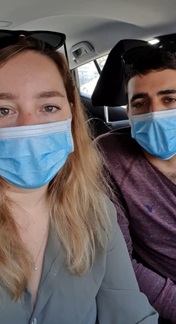
Fresh news
Eliram Elimelech will join us as COO on May 1st.
Eliram is 44 years old, a father of four, grew up in Arad, and currently lives in Kfar Kish. His wife is a social worker at the Megiddo Prison. Eliram is a graduate of the Mandel School of Educational Leadership. He holds a teaching diploma in social science and has completed a cadet course of the Welfare Ministry. He has a first degree in Social Science from Bar Ilan University, and a Master’s degree in Public Administration from Tel Aviv University. From 2006 to 2016 he worked as an instructor, educational coordinator, and manager of the North Hostel in Tiberias.
For the past 18 months, Eliram worked as an executive manager at EDNM, an organization dedicated to people with special needs, including autism, post-hospitalization, foster care, and more. In this position, he was responsible for hundreds of employees and tenants.
Adi Alkobi from Beer Sheba was chosen as our coordinator in the south. Adi is replacing Ronnie Weinberg. Adi is 25 years old, she grew up in Katzir, went to high school at Mevoot Iron, served as immigration and social integration coordinator at the IDF’s technology and logistic division. After completing a teaching and command course with honors in the Education Corps, and just before completing her service, she was named outstanding soldier. Adi has a first degree in education, sociology, and anthropology from Ben Gurion University. After her military service, she worked as an instructor at the “Jewish Spirit”.
Yoav Epstein, 27, has assumed responsibility for the NGO’s IT. Yoav grew up in Kfar Vradim and did his military service as an officer in battalion 50. He is a student of computer science at the Open University. He currently lives in Kadima with his wife, Rachel – our coordinator in the north.
Amit Tzur has stepped down from her position as office and HR manager and has taken up a position as head of innovation and entrepreneurship in the Air Force Association. Her replacement will step in at the beginning of May.
A bigger home
The expansion has forced us out of our previous office, to a larger office that allows us to hold group meetings, as well as one-on-one talks. We are still located at the Beit Herut compound, right next to the Beit Yanay interchange and M-Haderech commercial center. You are welcome to visit us.

Doing good
The “Mekusharim” venture
kicks off
“Mekusharim” (“Connected”) comprises a range of mentoring programs. It is held by the Labor, Welfare and Social Services Ministry, the RASHI Foundation, the Joint, and the Israeli Volunteering Network.
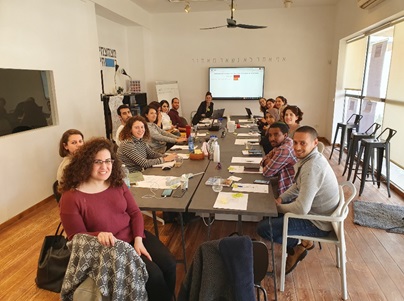
Nine NGOs were selected to an 18-month pilot: Closing Ranks, Fair Chance for Children, Amit Laderech, Bat Ami, ELEM, the Israel Spirit, Big Brothers Big Sisters of Israel, Menifa, and the Israel Volunteering Network. These organizations were asked to propose their optimal response to youth at risk, which may be implemented as a regular service of the Welfare Ministry at a later stage. We were given the privilege to host the March meeting in our office. It was an especially pleasant and successful meeting.
Gesher el Hanoar in Tel Av: Vered Levy moderated a group of mentors from Gesher el Hanoar (“Bridge to Youth”) which runs four homes for youth for the afternoons and evening during high school, helps them with their studies, teaches life skills and prepares them for meaningful military service. Towards the Fall, we will open a new group for their graduates, who completed their military or national service.
The Tzur Salem preparatory: the mentoring project of the Tzur Shalem graduates was completed with great success. The group was moderated by Amit Sarig, Vered Levy, and Omri Castelnueovo. September will see the opening of the next class of graduates.
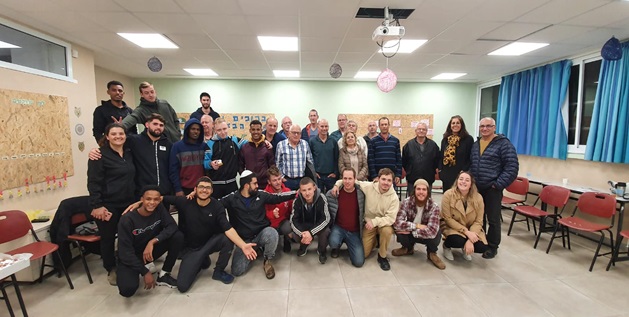
“Ofek Darom” at Intel Kiryat Gat
Intel Israel recruited 130 workers with no engineering training, training them to work in the Clean Room, including an option to obtain a technical engineer diploma. Each worker is assigned a mentor who helps his/her integration in the facility.
We proposed to help with our knowledge and experience in mentoring.
We introduced to Intel’s HR headquarter staff our ways of working, throuh a successful workshop. We concluded with a decision to continue the collaboration when the Coronavirus crisis ends.
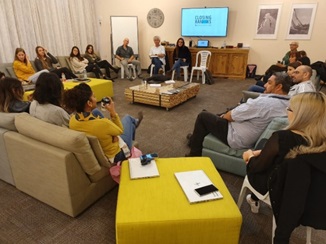
The assessment questionnaires: what have we learned?
At the beginning of every mentor class, we ask the young participants and the mentors to complete a questionnaire in order to map the needs and expectations. 12-18 months later we ask them to tell us to what extent mentoring has helped them and in what ways.
Thank you to everyone who completed a questionnaire.
The finding gleaned from Class 4 mentors are similar to the findings collected to date:
Young people
- 24% of the people who approach Closing Ranks are not eligible according to our criteria.
- The majority of youth become mature enough for mentoring a few month after they complete their military service or later. Our experience shows that the most effective source for recruiting new mentors is the matriculation completion courses and pre-academic preparatory courses.
- Nearly 75% of the young people mentoring at Closing Ranks are males.
- 81% report mentoring has helped them set clear goals.
- 92% reported mentoring gave them an edge in achieving their goals.
- 76% would resort to a mentor’s help when they reach a future crossroads.
- 87% trust the mentors.
- The mentor is a significant adult for 78% of the mentees.
Findings from the mentors’ reports:
- 97% are satisfied with the professional support they receive.
- 66% are satisfied with the group training sessions.
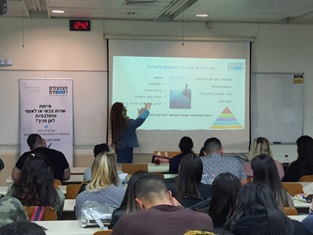
As part of implementing the insights, Closing Ranks’ staff continues the exposure meetings for young people, focusing on colleges and academic preparatory schools.
We maintain ongoing contact with Kinneret College, Ort Braude, Zfat College, Jezreel Valley College, the Ruppin College, Levinsky Teachers Seminary, Bar Ilan University, the Sami Shamoon College, the Sapir College, and the Technological College in Beer Sheba, Rehovot, and Tel Aviv.
Our young people
Shifra and Avi Kosteliz from Jerusalem accompanied Miriam Tzessler to her wedding. Miriam came to Israel from Poland and has attended the Yemin Ord Youth Village. She did her military service at the Education Corps. She is a graduate of “Lamerchav” Program.
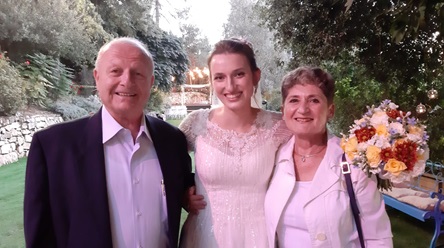
Milka Avshalomova from Kfar Yehezkel and her partner Tzur, are hugging their firstborn, a daughter named Alex.
Milka has graduated from the Steimberg Boarding School in Kfar Saba and is a graduate of “Lamerchav” Program as well. She has a first degree in social work, a master’s degree in international relations, and works at “Be-Atzmi” NGO.
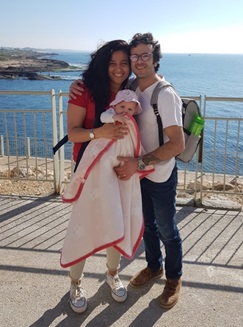
Yechiam Karu from Tivon, who mentors Yael Azga, a student at the Jezreel Valley College, wrote us: “These days, when everything we know has transformed and no end is in sight, I think about the young people we support, the difficulties they encounter, their efforts to stay on track, and the unclear future. I am confident that by working together, we will overcome the obstacles and come out stronger.
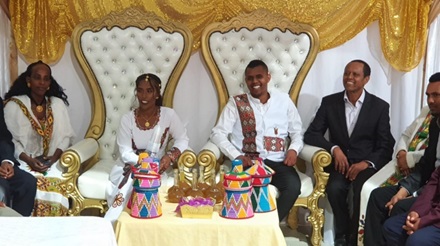
Shortly before it all began, I attended the colorful Henna ceremony of Yael, whom I have been mentoring for 2.5 years. It was a very special and moving event. The wedding was postponed because of COVID-19 restrictions, but when it’s over, we will return to celebrate and be happy. I know we will prevail.
Overcoming the loneliness, the obstacles, and the difficulties is possible through collaboration. So let us stand shoulder to shoulder, smile, take our friend’s hand and march together with faith and giving.”
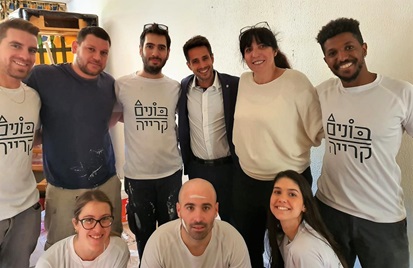
Building the town: we are also proud of Moshe Worko from Akko, a graduate of Closing Ranks, who together with two of his friends from the “Municipal Cadet” track of the Tel-Hai College, started a project of renovating the houses of underprivileged elderly in Kiryat Shmona.
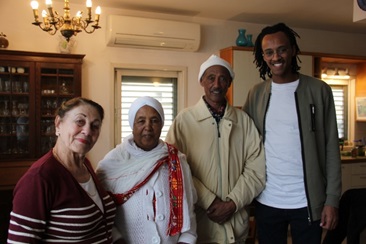
Using donations raised from companies and businesses, as well as many volunteers, they arrive once a month to another house on their list, together with the town’s Social Services team.
They paint the house while taking care to be respectful of the elderly tenants who opened their doors for them and protecting their privacy.
Following a challenging series of auditions, Yossef Yitzhak from Kiryat Malachi was admitted to the Beit Zvi School of Performing Arts on a full scholarship from “Olim Beyahad” and has moved to Tel Aviv.
Yossef is 25 years old, the youngest of 10 siblings from Ethiopian origin and the only one in his family to be born in Israel.
He completed high school at the Zionist Youth Village Neve Hadassah, served as a fighter in the Border Police, and has even attended a squad commander course.
One of us
Prof. Avi Nissan, heads the department of general and oncological surgery at the Sheba Medical Center. We got to know him in the 1970s as “Abu Niss” from Battalion 50. Avi is a physician and an unrelenting soldier. Even after he became a famous surgeon, he insisted on doing his reserve service as a deputy company commander, company commander, and battalion commander following a long argument with the IDF’s Chief Medical Officer. Avi has never relinquished his old values and friendships. Recently, he wrote to his staff at the Sheba Medical Center:
Pandemic days
Like many others, I have been devoting a great deal of thought recently, to the future of medicine on the day we take off our masks. How shall we go back to normal? Will we be able to go back to normal at all? What will remain from social distancing, telemedicine, and Zoom meetings? Will we persist in the new ways to work we have adopted?
It’s clear to everyone that we will get better, because this is how we are built. COVID-19 has given us a rare opportunity to scrutinize processes and slaughter some “holy cows”.
Until yesterday, I could not quite fathom out the unease I felt. Like a disciplined soldier, I wore the mask on March 17, when I entered the hospital, and have not removed it during the many hours I spend in the hospital. I avoid physical contact, adhere to social distancing rules, and communicate as much as possible by phone and WhatsApp to protect the staff, the visitors, and the patients.
Yesterday, I operated on a 27-year girl, who was transferred to us from another hospital. She was a very angry and bitter young woman, who grew up in a difficult home. She attacked anyone who approached her. She was diagnosed with a metastatic abdominal tumor.
We have operated on her for the first time several months ago, to ease her pain and allow her to eat. During hospitalization, she gradually let down the defense walls. Trust was established and with Inbal’s help, we succeed in domesticating the young wild animal, place her on a track of chemotherapy, and have Einat give her not only oncological therapy but also love and confidence.
The symptoms have gradually improved. The scans were better and we felt we were on the right track.
We went into the operation theatre again yesterday. I felt very combative, repeating to myself the mantra that ‘failure is not an option’. I was very focused on the surgery, convinced nothing could stop us.
As soon as the anesthesia took effect, I realized how terrible her condition was. The abdomen was seized by the tumor and by metastases that did not show in the imaging. Several hours into the operation, I realized I was fighting a lost battle. I refused to accept it, trying again and again to locate the thread that would lead me to resolution. I finally gave in, knowing her fate was determined. I left it to my assistants to complete the work.
For a long time, I was unable to step out and talk to her mother, in a futile attempt to postpone the inevitable.
Finally, we stood there: Inbal, Etti, Adile, and me, facing the mother while maintaining the necessary distance, with masks on our faces. We were going to deliver the horrible message. I could see the words flying over the distance between us and pierce her body like bullets. I saw the tremble, the blinking of paralyzing fear in the face of the terrible truth. I saw her shrink and fold into herself. Etti offered her a glass of water. She declined and I kept talking.
Suddenly, I felt the heaviness of the past few days erupting from inside me. I took off my mask, hugged her, and let her weep in my arms for a long time.
That evening, I went into the patient’s room. Her mother sat next to the bed, silent and reserved. The patient looked at me, then cried out, “Nissan, what happened?” I sat down, held her hand, and gave her all the details, as she shoots questions at me: “what will you do next? How much time have I got left?”
Then she broke down, “it’s unfair! You took my life away. Give it back!” I held onto her hand and stroked her head. I asked Einat to inject her Valium and waited until the drug took effect and she fell asleep
I continued to sit there, losing track of time. My thoughts were wandering. I thought about the ward and the situation we are in.
I remembered the books of Jim Collins, who researched the mega-corporations and the companies that survived through wars and technological transformation in an attempt to understand what made them so successful over decades while the world around them kept changing.
Collins’ conclusions were surprising. He discovered that it was all about preserving the core values on which the organization was built and which it continues to pursue. As long as the organization cherishes its core values, it will continue to survive and thrive.
I tried to think about what sets us apart, as a ward and Sheba in general from other hospitals and departments. I tried to list our core values.
Humility: all of us, individuals, or as a group have impressive accomplishments, professionals of the highest level, and providers of the best care to our patients. But none of us boasts these accomplishments or attempts to capitalize on them or use them for public relations.
Comradery: every group of people has arguments, controversies, and disagreement, which is right and healthy. But the important thing is to see below the surface, deep into the group’s heart, where true friendship lies, between physicians, nurses and physicians and nurses, and our extraordinary secretaries who sit in the depth of the war room, supporting us all, staff and patients alike.
Professionalism: our professionalism and excellence reflect not only the intellectual or technical capabilities or a specific physician. They are the result of respect to the patient, the ability to hear him or her out, and above all the close contact with the patient: the conversation, the physical examination, the handholding, or the hug. These are the things that make us who we are.
The patient woke up suddenly and asked for a cigarette. I calmed her until she fell asleep again and went home.
I went to bed, but could not fall asleep. I got up and roamed the house with a glass in my hand and thoughts racing through my head. More than anything else, I thought about ways to preserve our core values in a world that transforms in front of our eyes. What can we do not to lose the things that set us apart as a group, even though we come from different backgrounds?
Now that we are amidst the pandemic, I know what it is that we must not lose on the day after. The tragedy of a young woman and her mother taught me that we – individuals, groups, and society – must not lose the human touch and our distinct values.
The day we will be allowed to remove the masks, we will wake up to a different world, with fewer resources, with fear from strangers, a world of drawing in and isolation, and perhaps a new social and economic order.
We will change, and so will the technique, the modus operandi, the tactic, and perhaps the strategy for treating patients. But we must never relinquish the core values that set us apart as a group, organization, and society.
————————-
We conclude this newsletter with hopes for quick resolution of the pandemic, so we can meet as planned on our NGO Day.
Alon Schuster and the staff of
Closing Ranks


